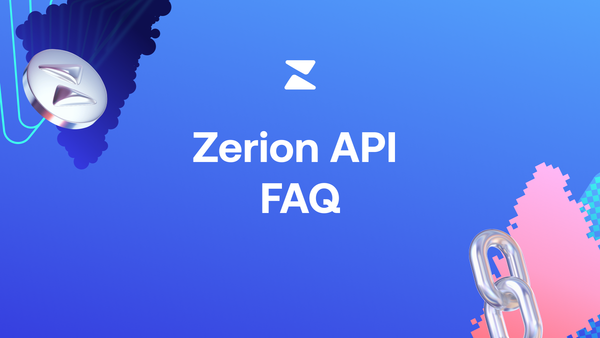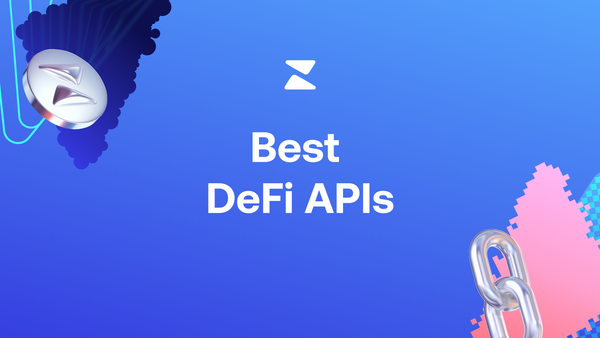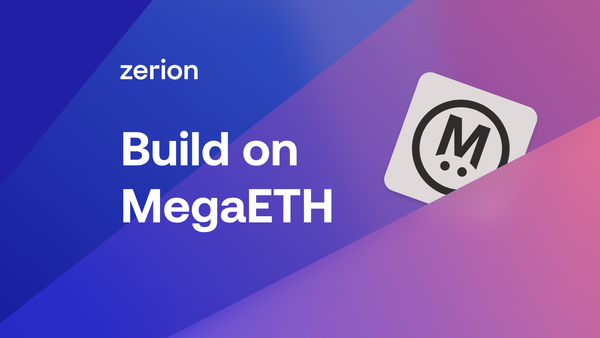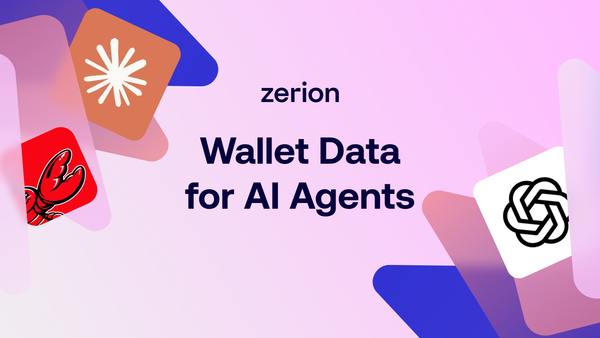Top 10 Crypto Wallet Data APIs (2026 Guide)
Unlock real-time insights with the best crypto wallet data APIs. Access comprehensive onchain data on balances, transactions, and more.

Finding the best crypto wallet data API can make or break your app. Whether you’re building a wallet, a DeFi dashboard, or a fintech integration, you need reliable real-time onchain data: balances, token positions, transactions, NFTs, and portfolios.
In this guide, we’ll explain what a wallet data API is, the most common use cases, how to choose one, and review the 10 best wallet data APIs in 2026. We’ll also highlight why Zerion API is the most complete solution for apps that want to deliver portfolio-ready data from day one.
What is Wallet Data API?
A wallet data API lets developers fetch blockchain wallet information without running their own nodes or building custom indexers. It transforms raw blockchain data into structured formats that apps can use.
With a single request, you can see:
- Balances across tokens and chains
- NFT collections with metadata
- Transaction histories
- DeFi protocol positions like staking, lending, and liquidity pools
- Portfolio overviews
- PnL for addresses and token positions, including amount invested, realized, and unrealized profit
Instead of setting nodes on each chain and parsing smart contracts, developers get clean, ready-to-use wallet data without worrying about data storage or performance.
Use Cases for Wallet Data API
Onchain wallet data is required for practically every crypto application, whether consumer, B2B, or institutional.
- Crypto wallets: Show balances, recent activity, and positions across chains
- DeFi dashboards: Display token and DeFi positions for connected wallet addresses
- Exchanges: Show available token lists for connected addresses
- Fintech apps: Integrate token balances and transactions into finance apps
- Analytics platforms: Track wallet portfolios and histories at scale
- AI agents: Ask questions about any address, its holdings, and transactions
The old way of getting this data would be to run your own blockchain nodes to get all raw block data and then index transactions to addresses. While this can still work, it breaks at scale when you need data from multiple chains. That’s when the new wallet APIs come in handy.
How to Choose Your API?
When comparing API providers, consider these factors:
- Blockchain data coverage: Does it support Ethereum, Layer-2s, and non-EVM chains such as Solana?
- Data depth: Does it cover only balances, or also NFTs and DeFi positions?
- Latency and reliability: Is the data fast and consistent across chains?
- Ease of use: Are the API endpoints simple to integrate, or do you need complex queries?
- Scalability: Can the API handle production traffic?
- Rate limits: What's the maximum number of requests you can make per second?
The real question is how well a wallet API can deliver experiences that feel complete in a way that’s fast and reliable. To help you choose, here’s a look at the leading solutions.
Top 10 Best Wallet Data APIs
Each of these APIs has its own strengths, from to deep DeFi coverage. Below, we break down the 10 best wallet data APIs in 2025, starting with Zerion API, the most complete option for apps that need portfolio-ready wallet data.
Zerion
Zerion API is the leading solution for portfolio-ready wallet data across 38+ blockchains, including Ethereum, major EVM networks, and Solana. Zerion offers 99.9% uptime SLA with up to 1,000 RPS with sub-second latency.
With endpoints for balances, historical transactions, DeFi protocol positions, NFTs, and PnL it delivers everything needed to power wallet experiences. With a single wallet API call, Zerion can fetch data from across all supported chains. Unlike raw blockchain queries, Zerion’s data is normalized and enriched, making integration fast and painless. Zerion's webhooks also let you subscribe to new transactions for any address.
Top apps like Base, Kraken, Rainbow, OpenSea, and Infinex trust Zerion API at scale. If you need reliable wallet data that “just works,” this is the best choice.
Alchemy
Alchemy is best known for its node infrastructure and enhanced APIs. It offers wallet-related endpoints like token balances, NFT metadata, and transaction history. Developers often choose Alchemy when they want to combine raw blockchain RPC access with higher-level wallet data.
Moralis
Moralis APIs cover balances, NFTs, transactions, and some DeFi positions. A strong appeal of Moralis is its SDKs and templates, which speed up app development. For teams prioritizing speed-to-prototype and developer experience, Moralis is a common entry point. However, it might still require client-side orchestration to build polished, financial-grade views.
Debank
Debank is a DeFi-focused blockchain API, built originally as a wallet tracker for DeFi protocols. Its coverage of lending, borrowing, and liquidity positions is among the best in the industry. Developers building DeFi dashboards or analytics apps often rely on Debank to surface user positions. Outside of DeFi, however, it offers less coverage, making it a specialized rather than a universal wallet API.
Zapper
Zapper’s API is closely tied to its portfolio tracking platform. It shows wallet balances, transaction data, and protocol-specific positions through endpoints. It is great for dashboards and embedded views, prioritizing usability and development speed over deep analytics.
Dune Sim
Dune Sim is essentially Dune’s query engine offered as an API. It provides decoded, indexed data across EVM and Solana chains, optimized for speed and dev-first ergonomics. Valuation, categorization, and labeling are left to the developer, which is perfect for infra-heavy teams. For wallet apps, however, it requires more effort to turn raw queries into portfolio-ready outputs, so it’s less optimized for real-time UX.
Allium
Allium targets institutional and enterprise clients, offering blockchain APIs with a focus on compliance, data quality, and advanced structuring. It’s well-suited for funds, auditors, or companies needing high-trust analytics data. While strong in data precision and reporting, Allium is less commonly used for wallet UIs or consumer apps due to its heavier integration model.
Bitquery
Bitquery provides low-level blockchain APIs with very wide chain coverage. Developers can query balances, transfers, and transactions across many networks. Its flexibility is useful for analytics-heavy projects or niche chains not well covered elsewhere. The tradeoff is that developers often need to process and normalize the data themselves, making Bitquery better suited for analytics and compliance tools rather than consumer-facing wallets.
GoldRush (Covalent)
GoldRush, formerly known as Covalent, is one of the longest-running wallet data APIs. It covers balances, transactions, and NFTs across dozens of chains. Its strength is breadth of coverage and a long history of supporting developers. While the API delivers structured wallet data, latency and normalization can sometimes lag behind newer solutions. Still, it remains a widely recognized option in the wallet API market.
Quicknode
Quicknode started as a node-as-a-service provider and added enhanced APIs for balances, NFTs, and transactions. Its wallet data endpoints are reliable, backed by strong infrastructure. For developers who already use Quicknode for RPC access, adding its wallet API is convenient. However, the wallet data layer is more limited compared to APIs built specifically for portfolio tracking and positions.
Build Now
The right wallet data API can save months of development and unlock new product features instantly.
Zerion API is trusted by the biggest names in crypto to deliver balances, transactions, NFTs, and DeFi positions across 26+ chains. Fast, reliable, and production-ready.
Sign up now for free Zerion API developer keys and start building today.





